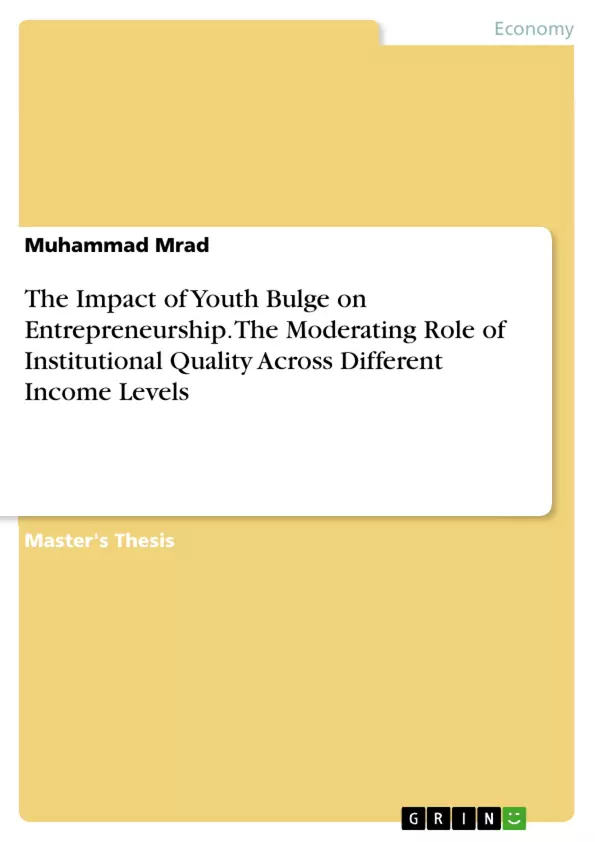This paper investigates the relationship between the youth bulge and entrepreneurship, with the quality of institutions acting as a moderating factor across diverse income levels. The youth bulge, defined as the proportion of young people in a population, is recognized as one of the drivers of economic development. However, its relationship with entrepreneurship, particularly when moderated by institutional quality, has not been widely explored. This thesis examines this relationship using two different indicators of entrepreneurship and a dataset covering a wide range of countries across the income spectrum.
The study finds evidence supporting a U-shaped relationship between income levels and New Business Density but finds no evidence of such a relationship between income levels and Total Early-stage Entrepreneurial Activity. The empirical analysis reveals that youth has a negative effect on New Business Density in low-income countries and a positive effect in high-income countries, while it has a positive effect on entrepreneurial activity across all income levels. The quality of institutions plays a significant moderating role in shaping this relationship. A one percentage point increase in the youth bulge causes an increase in Total Early-stage Entrepreneurial Activity by approximately 0.6 percentage points and an increase in the New Business Density index by approximately 0.1 points. These results are robust across all models, with insufficient evidence for the negative effect of the youth bulge on New Business Density in lower-income countries. Additionally, the study provides evidence of a U-shaped relationship between the shadow economy and entrepreneurship, as well as between Governance Indicators and entrepreneurship.
Inhaltsverzeichnis (Table of Contents)
- ABSTRACT
- 1. INTRODUCTION:
- 2. LITERATURE REVIEW:
- 3. THEORETICAL FRAMEWORK:
- 4. DATA AND METHODOLOGY:
- 5. EMPIRICAL RESULTS:
- 6. DISCUSSION:
- 7. CONCLUSIONS:
- 8. RECOMMENDATIONS:
- ACKNOWLEDGMENT:
- REFERENCES:
- INDEX:
- APPENDIX:
Zielsetzung und Themenschwerpunkte (Objectives and Key Themes)
This research paper investigates the intricate relationship between the Youth Bulge, a significant demographic factor, and entrepreneurial activity, with a particular focus on the moderating impact of institutional quality across varying income levels. The study delves into the economic implications of a large youthful population and its influence on entrepreneurial endeavors within different socio-economic contexts.
- The relationship between Youth Bulge and entrepreneurship.
- The role of institutions in shaping the relationship between Youth Bulge and entrepreneurship.
- The influence of income levels on entrepreneurship activity.
- The impact of Youth Bulge on entrepreneurial activity in different income levels.
- The moderating effect of institutional quality on the relationship between Youth Bulge and entrepreneurship across various income levels.
Zusammenfassung der Kapitel (Chapter Summaries)
- Introduction: This chapter introduces the research topic, outlining the significance of the relationship between Youth Bulge, entrepreneurship, and institutional quality. It highlights the challenges and opportunities presented by a large youth population and the potential role of entrepreneurship in fostering economic development and stability. The chapter also reviews existing literature on Youth Bulge, entrepreneurship, and institutions.
- Literature Review: This chapter delves deeper into the theoretical background of the research, providing a comprehensive review of relevant literature on entrepreneurship, demographics, and governance. It explores existing models and frameworks that have been used to analyze the relationship between these factors, providing context for the current study.
- Theoretical Framework: Building upon the literature review, this chapter presents a theoretical framework that guides the empirical research. It elaborates on the key hypotheses and arguments that underpin the study, providing a clear understanding of the expected relationships between Youth Bulge, entrepreneurship, and institutional quality.
- Data and Methodology: This chapter outlines the data sources used in the research and the specific methodologies employed to analyze the data. It explains the chosen indicators for measuring Youth Bulge, entrepreneurship, and institutional quality, and provides a detailed description of the statistical techniques used to test the hypotheses.
- Empirical Results: This chapter presents the main findings of the empirical research, focusing on the statistical analysis and its implications. It examines the relationships between the variables, including the moderating effects of institutions and income levels, and discusses the significance of the results.
- Discussion: This chapter interprets the empirical findings in light of the theoretical framework and existing literature. It discusses the potential limitations of the study, considering the possibility of type one or two errors and the differences between the used indicators. It also explores the implications of the findings for policy decisions and future research.
Schlüsselwörter (Keywords)
The main keywords and focus topics of this research are: Youth Bulge, entrepreneurship, institutional quality, governance, income level, and economic development. The research investigates the relationship between these concepts, exploring the impact of a large young population on entrepreneurial activities, the role of institutions in shaping these relationships, and the influence of income levels on entrepreneurial outcomes.
- Quote paper
- Muhammad Mrad (Author), 2023, The Impact of Youth Bulge on Entrepreneurship. The Moderating Role of Institutional Quality Across Different Income Levels, Munich, GRIN Verlag, https://www.grin.com/document/1496128



